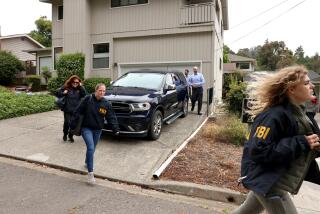Duvall’s recorded sexual boasts draw FBI’s attention
- Share via
SACRAMENTO — Former Assemblyman Michael Duvall’s recorded boasts that he had sexual relations with a woman believed to be a lobbyist have drawn the attention of the FBI, whose agents have begun questioning associates of the disgraced Republican from Yorba Linda.
Agents have talked to at least two former Duvall employees as potential witnesses to determine whether there is evidence of criminal wrongdoing that could lead to an investigation, officials said.
“We did make contact with the two aides,” said Special Agent Steve Dupre, a spokesman for the FBI. He declined to comment further.
The aides include Duvall’s former chief of staff, Carolyn Ginno, according to people familiar with the inquiries who were not authorized to speak publicly about the matter.
Ginno declined to comment, and other aides to Duvall did not return calls.
Duvall resigned Sept. 9 after a videotape was widely distributed in which he told another assemblyman, on an open microphone, about sex with a woman later identified in media reports as a lobbyist for a public utility company. Duvall, who is married, was vice chairman of the Assembly’s utilities committee.
He did not return calls to his businesses Friday. He said after his resignation that his decision was “in no way an admission that I had an affair or affairs. My offense was engaging in inappropriate storytelling, and I regret my language and choice of words.”
The lobbyist for Sempra Energy has been placed on temporary leave.
“The company’s investigation is continuing,” said Art Larson, a spokesman for the utility, who reiterated that the lobbyist has “denied the allegations reported in the media.”
Meanwhile, an investigation of Duvall’s actions by the Assembly’s ethics committee appeared dead Friday after the Legislature’s top lawyer said his resignation eliminated the panel’s jurisdiction over him.
Legislative Counsel Diane F. Boyer-Vine advised lawmakers that the authority of the committee “is limited to determining whether a member of the house may continue to serve as a member of the house.”
Assembly Speaker Karen Bass (D-Los Angeles) said a review would instead be conducted to develop safeguards “to ensure that the relationships between legislators and legislative advocates remain totally aboveboard and consistent with the public’s best interests.”
“Based on the information presented by counsel, my understanding now is that the Assembly’s disciplinary ability -- with its harshest penalty being removal from office -- was fulfilled by the resignation,” said Bass, who had no comment on the FBI’s inquiries. “Mr. Duvall is left to face the consequences of his actions.”
However, Assemblyman Paul Krekorian (D-Los Angeles), who co-chairs the ethics committee, said he wanted to explore further with legal counsel whether the panel might continue the probe in some other form.
The apparent halt of the Assembly’s probe was denounced by Derek Cressman, western regional director for the watchdog group Common Cause.
“It’s a cop-out,” Cressman said, adding that the panel could look at whether other legislators had improper ties to lobbyists. It’s appropriate for the FBI to get involved, he said, “if California can’t deal with it on its own.”
Retired agent Jim Wedick, who was involved in the FBI’s undercover sting known as Shrimpscam, which sent several California legislators to federal prison in the 1990s, said the information made public in the Duvall scandal so far justifies queries by federal authorities. “It’s smoke that should be looked at to see if there is any fire,” he said.
The FBI’s questions under such circumstances typically might focus on “whether there was some quid pro quo,” whether a lawmaker voted a certain way or gave “assurances in return for favors that he would vote a certain way,” said Frank Scafidi, a retired supervisory agent for the FBI who worked in the Sacramento office.
--
patrick.mcgreevy @latimes.com
Times staff writer Shane Goldmacher contributed to this report.
More to Read
Get the L.A. Times Politics newsletter
Deeply reported insights into legislation, politics and policy from Sacramento, Washington and beyond. In your inbox twice per week.
You may occasionally receive promotional content from the Los Angeles Times.











